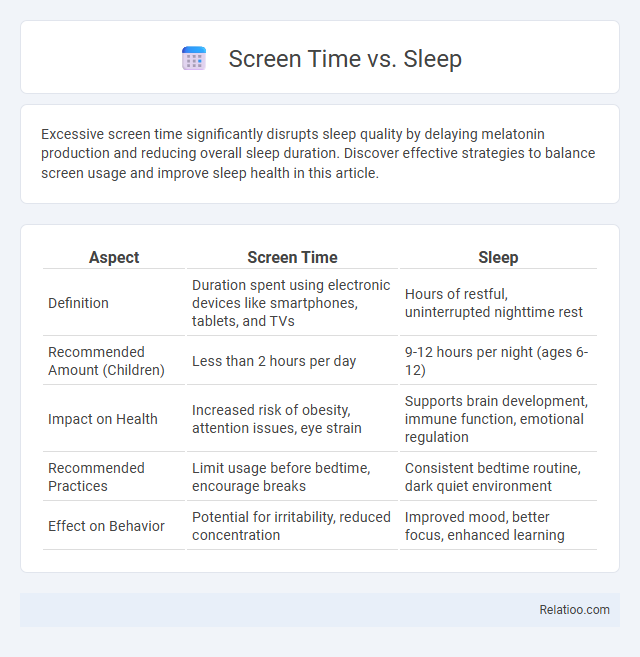Excessive screen time significantly disrupts sleep quality by delaying melatonin production and reducing overall sleep duration. Discover effective strategies to balance screen usage and improve sleep health in this article.
Table of Comparison
| Aspect | Screen Time | Sleep |
|---|---|---|
| Definition | Duration spent using electronic devices like smartphones, tablets, and TVs | Hours of restful, uninterrupted nighttime rest |
| Recommended Amount (Children) | Less than 2 hours per day | 9-12 hours per night (ages 6-12) |
| Impact on Health | Increased risk of obesity, attention issues, eye strain | Supports brain development, immune function, emotional regulation |
| Recommended Practices | Limit usage before bedtime, encourage breaks | Consistent bedtime routine, dark quiet environment |
| Effect on Behavior | Potential for irritability, reduced concentration | Improved mood, better focus, enhanced learning |
Understanding Screen Time and Its Prevalence
Screen time, defined as the duration spent using devices with screens such as smartphones, tablets, and computers, has become prevalent worldwide, with the average adult spending approximately 7 hours daily on these devices. Excessive screen time is strongly associated with reduced sleep quality and duration, as the blue light emitted from screens interferes with melatonin production and disrupts circadian rhythms. Studies indicate that managing screen time, especially before bedtime, is crucial for improving sleep patterns and overall cognitive function.
The Importance of Quality Sleep
Quality sleep plays a crucial role in maintaining cognitive function and overall health, especially when balancing screen time. Excessive screen exposure before bed disrupts melatonin production, making it harder for Your body to enter deep, restorative sleep cycles vital for memory consolidation and emotional regulation. Prioritizing screen-free time before sleep enhances sleep quality, improving focus and daytime productivity.
How Screen Time Disrupts Sleep Patterns
Excessive screen time, especially before bedtime, disrupts your sleep patterns by suppressing melatonin production, the hormone responsible for regulating sleep-wake cycles. Blue light emitted from smartphones, tablets, and computers delays the onset of deep sleep, leading to shorter and lower-quality rest. Reducing screen exposure in the evening can significantly improve your sleep duration and overall sleep health.
Blue Light Exposure: Effects on Melatonin Production
Blue light exposure from screens significantly reduces melatonin production, disrupting the natural sleep-wake cycle and leading to poorer sleep quality. Studies show that evening screen time suppresses melatonin by up to 60%, delaying sleep onset and decreasing REM sleep duration. Limiting screen use before bedtime or using blue light filters can help maintain melatonin levels and improve restorative sleep.
Screen Time Before Bed: Myths vs. Facts
Screen time before bed is often blamed for disrupting sleep, but the impact varies based on screen type, brightness, and individual sensitivity to blue light. Research shows that exposure to blue light from screens can suppress melatonin production, delaying sleep onset, yet not all screen use equally affects your sleep quality. Understanding the difference between myths and facts helps you make informed decisions about managing screen time for better rest.
Ideal Screen Time Limits for Healthy Sleep
Limiting screen time to under two hours daily is crucial for maintaining healthy sleep patterns, as excessive exposure to blue light disrupts melatonin production and circadian rhythms. Studies show that reducing screen usage at least one hour before bedtime improves sleep quality, duration, and cognitive function. Implementing strict screen time limits supports better sleep hygiene and overall mental well-being.
Strategies for Reducing Evening Screen Use
Limiting evening screen time improves sleep quality by reducing blue light exposure, which interferes with melatonin production and disrupts circadian rhythms. Strategies such as setting device curfews, using blue light filters or night mode, and engaging in relaxing offline activities enhance sleep onset and duration. Research from the National Sleep Foundation highlights that reducing screen use an hour before bedtime significantly decreases sleep latency and improves overall restfulness.
Alternative Activities to Promote Better Sleep
Excessive screen time disrupts melatonin production, leading to poor sleep quality and delayed sleep onset. Engaging in alternative activities such as reading physical books, practicing mindfulness meditation, and performing light stretching before bedtime can significantly improve sleep duration and depth. Reducing exposure to blue light from electronic devices at least one hour before sleep supports the body's natural circadian rhythm and enhances overall sleep hygiene.
Tips for Parents: Managing Kids’ Screen Habits
Limiting screen time before bed significantly enhances children's sleep quality by reducing blue light exposure, which disrupts melatonin production and circadian rhythms. Establishing consistent technology-free routines, such as reading or quiet play, promotes better sleep hygiene and overall well-being. Parents should set clear screen time boundaries, encourage physical activity, and monitor content to balance digital engagement with healthy sleep patterns.
Building a Balanced Routine for Screens and Sleep
Excessive screen time disrupts sleep quality by interfering with melatonin production and extending exposure to blue light, negatively impacting circadian rhythms. Establishing a balanced routine involves setting technology curfews at least one hour before bedtime and prioritizing sleep hygiene to enhance restorative rest. Incorporating screen breaks and mindfulness techniques supports cognitive focus during daytime tasks while maintaining optimal sleep patterns.

Infographic: Screen time vs Sleep
 relatioo.com
relatioo.com